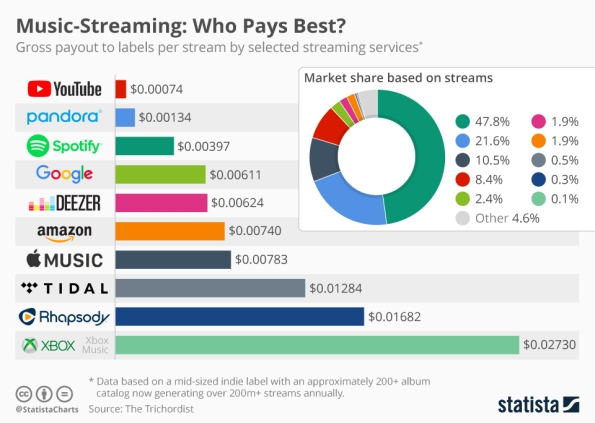YouTube Reports $15 Billion In Revenue, CEO Wants More – Where’s Ours?
YouTube’s annual revenue exceeded $15 billion in 2019. Even so, the CEO suggests there’s significantly more room for growth, leading some to question where their piece of the pie is.
Op-ed by Chris Castle of Music Technology Policy and ArtistRightsWatch
Very insightful reporting from Rob Copeland at WSJ on Google’s revenue that culls out YouTube’s share of Google’s revenue–and boy are we getting hosed.
Alphabet said YouTube exceeded $15 billion in annual revenue in 2019. That would be on the lower end of projections for the video business, which has been the subject of educated guesses for years, and suggests that YouTube pulls in less than $8 a year from each of its 2 billion users. On a call with analysts, Mr. Pichai said he believes there is “significantly more room” to make money off YouTube’s users.
Read the post on the Wall Street Journal.
Given that YouTube is heavily dependent on music videos, it’s hard to explain how YouTube is dead last in royalty rates:

And remember, according to BrandWatch, “[a]s of Jan 2020, the 93% of the most-watched videos [on YouTube] were music videos” and according to IFPI’s Music Consumer Insight Report, 47% of time spent by fans listening to on-demand music is on YouTube. So it’s hard to explain why YouTube royalties are so low–and I would actually say that YouTube royalties are actually negative when you take into account the total cost of dealing with YouTube on DMCA, Content Management System and Content ID.
If you can afford it–remember the A2IM and Future of Music Coalition study that showed the main reason that independent’s don’t pursue their rights is because they can’t afford to. Not a big leap that they definitely can’t afford to challenge Google.

It’s all a little hard to understand. Even at 1% of YouTube revenue for publishing, comparable to the low public performance royalty at radio (distorted by the radio oligopoly), the songwriters alone should divide up $150,000,000–in a comparable deal. Artists should be grossing well over that in line with historical ratios. Given the outsized impact of music on YouTube’s revenue, shouldn’t the total industry-wide royalty payment be vastly more than $150,000,000? Why do we get hosed so badly on YouTube revenues? My bet is that it’s not at the negotiator level. Those are some of the most talented negotiators in the world.
But they’re on a leash and Google knows it. It’s always seemed to be a situation where eventually someone upstairs calls and says, thanks for the great work on YouTube negotiation–we’ll take it from here. And you see the result. Hard to explain any other way.
But it may help to explain why this person is laughing at us.
